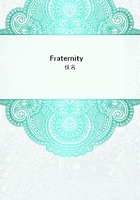
第8章
What do you really think, Uncle Hilary?"
Turning at his writing-table to look at the face of his young niece, Hilary Dallison answered:
"My dear, we have had the same state of affairs since the beginning of the world. There is no chemical process; so far as my knowledge goes, that does not make waste products. What your grandfather calls our 'shadows' are the waste products of the social process. That there is a submerged tenth is as certain as that there is an emerged fiftieth like ourselves; exactly who they are and how they come, whether they can ever be improved away, is, I think, as uncertain as anything can be."The figure of the girl seated in the big armchair did not stir. Her lips pouted contemptuously, a frown wrinkled her forehead.
"Martin says that a thing is only impossible when we think it so.""Faith and the mountain, I'm afraid."
Thyme's foot shot forth; it nearly came into contact with Miranda, the little bulldog.
"Oh, duckie!"
But the little moonlight bulldog backed away.
"I hate these slums, uncle; they're so disgusting!"Hilary leaned his face on his thin hand; it was his characteristic attitude.
"They are hateful, disgusting, and heartrending. That does not make the problem any the less difficult, does it?""I believe we simply make the difficulties ourselves by seeing them."Hilary smiled. "Does Martin say that too?"
"Of course he does."
"Speaking broadly," murmured Hilary, "I see only one difficulty--human nature."
Thyme rose. "I think it horrible to have a low opinion of human nature.""My dear," said Hilary, "don't you think perhaps that people who have what is called a low opinion of human nature are really more tolerant of it, more in love with it, in fact, than those who, looking to what human nature might be, are bound to hate what human nature is."The look which Thyme directed at her uncle's amiable, attractive face, with its pointed beard, high forehead, and special little smile, seemed to alarm Hilary.
"I don't want you to have an unnecessarily low opinion of me, my dear. I'm not one of those people who tell you that everything's all right because the rich have their troubles as well as the poor. Acertain modicum of decency and comfort is obviously necessary to man before we can begin to do anything but pity him; but that doesn't make it any easier to know how you're going to insure him that modicum of decency and comfort, does it?""We've got to do it," said Thyme; "it won't wait any longer.""My dear," said Hilary, "think of Mr. Purcey! What proportion of the upper classes do you imagine is even conscious of that necessity?
We, who have got what I call the social conscience, rise from the platform of Mr. Purcey; we're just a gang of a few thousands to Mr. Purcey's tens of thousands, and how many even of us are prepared, or, for the matter of that, fitted, to act on our consciousness? In spite of your grandfather's ideas, I'm afraid we're all too much divided into classes; man acts, and always has acted, in classes.""Oh--classes!" answered Thyme--"that's the old superstition, uncle.""Is it? I thought one's class, perhaps, was only oneself exaggerated--not to be shaken off. For instance, what are you and I, with our particular prejudices, going to do?"Thyme gave him the cruel look of youth, which seemed to say: 'You are my very good uncle, and a dear; but you are more than twice my age.
That, I think, is conclusive!'
"Has something been settled about Mrs. Hughs?" she asked abruptly.
"What does your father say this morning?"
Thyme picked up her portfolio of drawings, and moved towards the door.
"Father's hopeless. He hasn't an idea beyond referring her to the S.P.B."She was gone; and Hilary, with a sigh, took his pen up, but he wrote nothing down ....
Hilary and Stephen Dallison were grandsons of that Canon Dallison, well known as friend, and sometime adviser, of a certain Victorian novelist. The Canon, who came of an old Oxfordshire family, which for three hundred years at least had served the Church or State, was himself the author of two volumes of "Socratic Dialogues." He had bequeathed to his son--a permanent official in the Foreign Office--if not his literary talent, the tradition at all events of culture.
This tradition had in turn been handed on to Hilary and Stephen.
Educated at a public school and Cambridge, blessed with competent, though not large, independent incomes, and brought up never to allude to money if it could possibly be helped, the two young men had been turned out of the mint with something of the same outward stamp on them. Both were kindly, both fond of open-air pursuits, and neither of them lazy. Both, too, were very civilised, with that bone-deep decency, that dislike of violence, nowhere so prevalent as in the upper classes of a country whose settled institutions are as old as its roads, or the walls which insulate its parks. But as time went on, the one great quality which heredity and education, environment and means, had bred in both of them--self-consciousness--acted in these two brothers very differently. To Stephen it was preservative, keeping him, as it were, in ice throughout hot-weather seasons, enabling him to know exactly when he was in danger of decomposition, so that he might nip the process in the bud; it was with him a healthy, perhaps slightly chemical, ingredient, binding his component parts, causing them to work together safely, homogeneously. In Hilary the effect seemed to have been otherwise; like some slow and subtle poison, this great quality, self-consciousness, had soaked his system through and through; permeated every cranny of his spirit, so that to think a definite thought, or do a definite deed, was obviously becoming difficult to him. It took in the main the form of a sort of gentle desiccating humour.